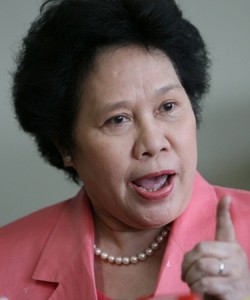Senate President Juan Ponce Enrile may have compromised state secrets when he read on the Senate floor the notes supposedly written by Philippine Ambassador to China Sonia Brady after a heated confrontation with Sen. Antonio Trillanes IV last week.
Sen. Miriam Santiago said an ambassador’s reports “are always, always highly confidential and are meant only for the eyes of the Secretary of Foreign Affairs” who is given discretion on whether to report the contents to President Benigno Aquino.
Enrile whipped out the so-called Brady notes on Wednesday after Trillanes delivered a speech denouncing the Senate President’s “bullying” allegedly to pressure other senators into approving the bill dividing Camarines Sur.
Trillanes had claimed that Enrile was acting at the behest of former President Gloria Macapagal-Arroyo, and that dividing the province would benefit Arroyo allies Rep. Luis Villafuerte and Deputy Speaker Arnulfo Fuentebella, who could then seek public office in the 2013 elections.
Enrile said the notes indicated that Trillanes had dismissed the significance of the Panatag Shoal being claimed by both the Philippines and China and that the young senator may have compromised national security during the times he was backchannelling for the Philippine government.
But Enrile’s revelation of the notes’ contents may have its own repercussions, Santiago said in an ambush interview.
“In any event, the public is not supposed to know about these notes because diplomacy is always conducted sub rosa (in secret),” she added. “Everything you read is the reality on the ground (but) there is a difference between the relationship (between the Philippines and China) as it ought to be and the relationship as it actually is.”
Santiago also wondered how Enrile managed to get the Brady notes in the first place.
“Why did the Senate President obtain a copy of that report which was not meant for him? How did he manage to do that?” she said.
But Enrile dismissed the warning in a separate interview, saying that he had revealed details about Trillanes’ conduct to show the public that the younger senator “(was) selling the republic to another country.”
What he did was “the duty of a real senator, which is to protect this country,” the Senate President added.
In an interview over Radyo Inquirer Monday, Trillanes said he had briefed Brady about his meetings with his Chinese contacts so the ambassador could keep tabs on his activities “since she reported to the (Philippine) embassy only sometime in early August.”
The so-called “Brady notes” were actually the minutes of the one-on-one meeting he held with the ambassador, Trillanes said, adding that there were no Chinese representatives present, but only Consul Evangeline Jimenez Ducrocq and a member of his staff. The two-hour meeting was held from 11 a.m. to 1 p.m. at the Philippine Embassy in Beijing on Aug. 17, he added.
Trillanes said he reported to Brady the reaction of the Chinese to the Scarborough conflict.
“I told her there was a need to de-escalate the tension because the Filipinos in China were feeling the brunt of it, they were (being) harassed by their employers,” he added.
“But back home, we Filipinos did not mistreat the Chinese. We did not really care, we just went on with our lives,” Trillanes said, clarifying the quote that Enrile had read on the Senate floor about Filipinos being “unmindful of the conflict.”
“He maliciously took it out of context,” Trillanes said of the quote that he said Enrile had interpreted to mean that Filipinos could not be bothered with the issue.
Trillanes also slammed the media for not authenticating the so-called Brady notes that were released “(by) a man who faked his own ambush,” he said.
